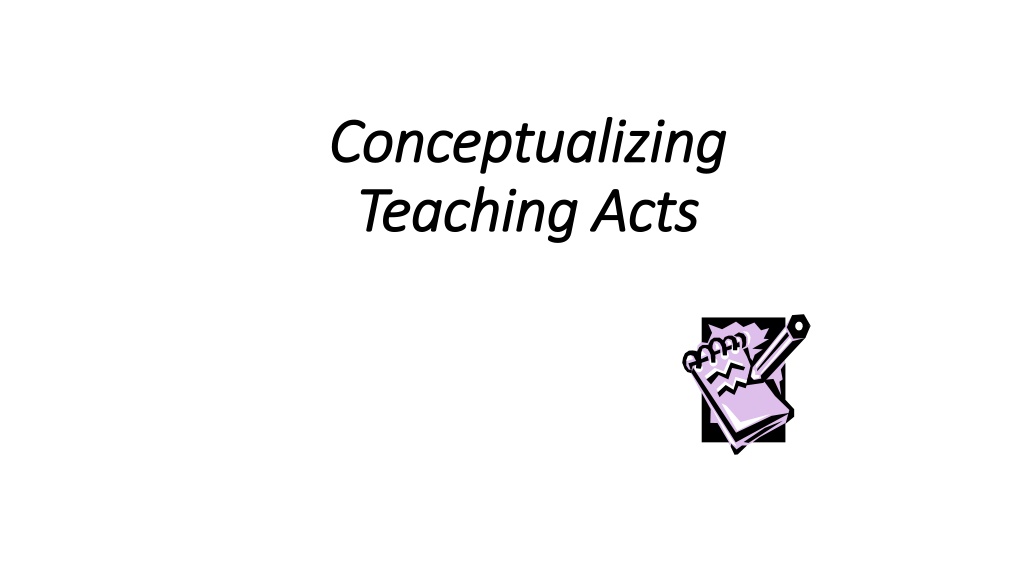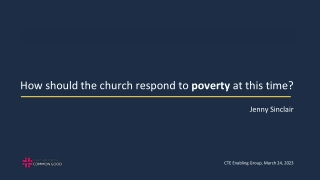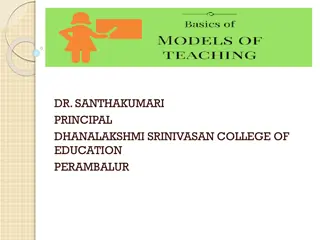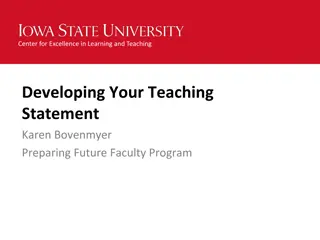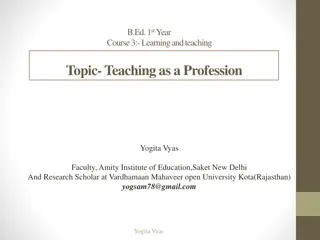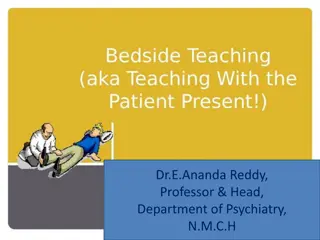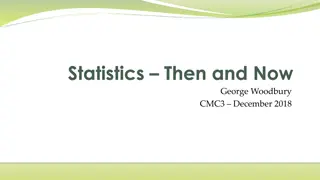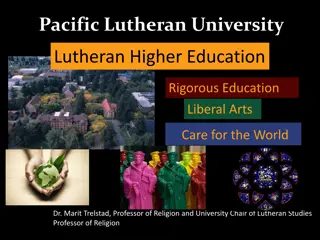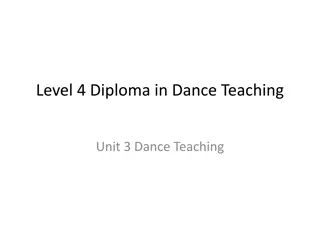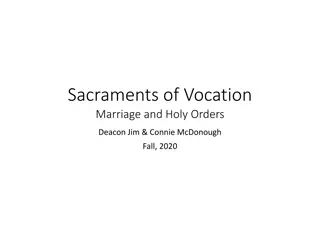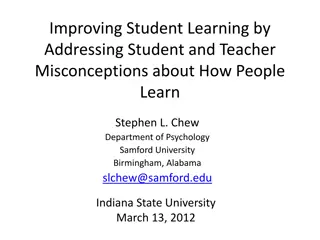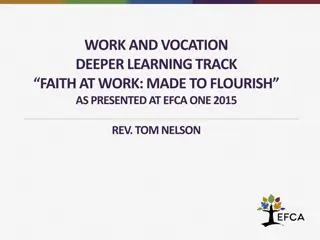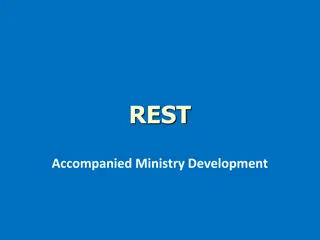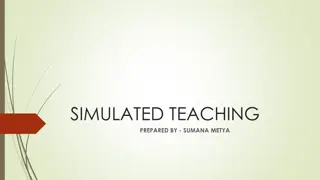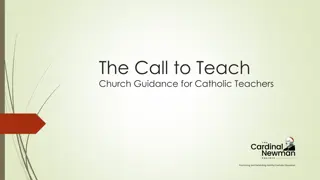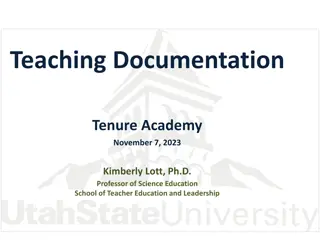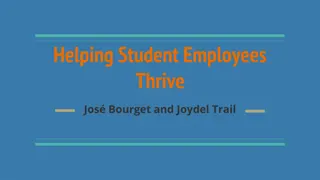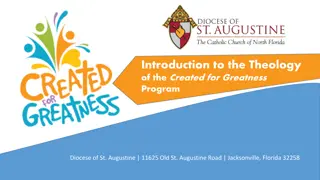Understanding the Vocation of Teaching
Teaching is more than just a job; it is a vocation that involves a sense of calling, public service, personal fulfillment, and identity. It goes beyond mere sustenance or survival provided by a job and differs from a career or profession by emphasizing personal significance, autonomy, and service to others. This insightful exploration delves into the unique nature of teaching as a vocation compared to other forms of work and occupation.
Download Presentation

Please find below an Image/Link to download the presentation.
The content on the website is provided AS IS for your information and personal use only. It may not be sold, licensed, or shared on other websites without obtaining consent from the author. Download presentation by click this link. If you encounter any issues during the download, it is possible that the publisher has removed the file from their server.
E N D
Presentation Transcript
Conceptualizing Conceptualizing Teaching Acts Teaching Acts
Teaching: art & science Teaching is basically a subjective activity carried out in an organized way That is why some educators don not consider any rules for it and do not consider it as a discipline
So, this experience makes teaching: challenging engaging fulfilling frustrating
Hansen (1995) characterized teaching as a vocation Latin root vocare, meaning to call, teaching as a vocation comprises a form of public service to others that at the same time provides the individual a sense of identity and personal fulfilment
a job is an activity that provides sustenance or survival. It comprises highly repetitive tasks that are not defined and developed by those performing them. vocation goes well beyond sustenance and survival; it guarantees personal autonomy and personal significance. work may ensure personal autonomy and can therefore yield genuine personal meaning but, unlike vocation, it need not imply being of service to others. a career describes a long-term involvement in a particular activity but differs from vocation in similar ways that job and work do, that is, it need not provide personal fulfilment, a sense of identity, nor a public service.
an occupation is an endeavour harboured within a societys economic, social, and political system, but persons can have occupations that do not entail a sense of calling in the same way vocations do. a profession broadens the idea of an occupation by emphasizing the expertise and the social contribution that persons in an occupation render to society. However, profession differs from vocation in two important ways. First, persons can conduct themselves professionally but not regard the work as a calling, and can derive their sense of identity and personal fulfillment elsewhere. Second, perks such as public recognition and rewards normally associated with professions run counter to personal and moral dimensions of vocations.
It is the language of vocation that brings us closer to what many teachers do, and why they do it, than does the language of job, work, occupation or profession (Hansen, p. 8).
Teaching is aimed at creating optimal conditions for desired learning to take place in as short a time as possible. Teaching Learning ???? We know by experiential knowledge that teaching does not have to automatically lead to learning; conversely, learning can very well take place in the absence of teaching!!! Teaching can contribute to accelerated and accomplished learning
Educational chain: educational administrators policy makers curriculum planners teacher educators textbook writers BUT: The players who have a direct bearing on shaping and reshaping the desired learning outcome are the classroom teachers.
The Role of the Teacher The teacher has been variously referred to as an artist and an architect; a scientist and a psychologist; a manager and a mentor; a controller and a counsellor; a sage on the stage; a guide on the side; and more. From a historical perspective, there are three strands of thought: (a) teachers as passive technicians (b) teachers as reflective practitioners (c) teachers as transformative intellectuals
Teachers as Passive Technicians behavioural school of psychology emphasized the importance of empirical verification content knowledge (of verified and verifiable set of facts and clearly articulated rules) teacher-proof packages: easily manageable discrete items given to teachers Teachers and their teaching methods are not considered very important teacher education programs concentrate more on the education part than on the teacher part Empirical verification + content knowledge + technicist view Professional experts
Thus Classroom teachers: learn a battery of content knowledge pass it on to successive generations of students Their success is measured in terms of how closely they adhere to the professional knowledge base how effectively they transmit knowledge base Primary role: function like a conduit operate from handed-down fixed, pedagogic assumptions
This view is traditional It is still in use in many parts of the world It can provide a safe and secure environment for some teachers..Why? Theorists conceive and construct knowledge, teachers understand and implement knowledge Creation of new knowledge or a new theory is not the domain of teachers. teachers task is to execute what is prescribed for them The whole idea will lead to the disempowerment of Teachers who are confined to received knowledge rather than lived experience.
Teachers as Reflective Practitioners originally proposed by educational philosopher John Dewey (early 20thcentury) Pinpoints the difference between routine and reflective action What is the difference?
Routine action is guided primarily by an uncritical belief in tradition, and an unfailing obedience to authority, whereas reflective action is prompted by a conscious and cautious consideration of any belief or practice in light of the grounds that support it and the further consequences to which it leads (Dewey, 1933, p. 4).
Deweyan view Teaching is: a series of predetermined and presequenced procedures action grounded in intellectual thought
Task analysis problem-solvers derive explanatory principles Teachers Look critically Look imaginatively do anticipatory planning
An expansion of Deweys concept of reflection. He shows how teachers, through their informed involvement in the principles, practices, and processes of classroom instruction, can bring about fresh and fruitful perspectives to the complexities of teaching that cannot be matched by experts who are far removed from classroom realities. Schon
Reflection-on-action & Reflection-in-action Reflection-on-action can occur before and after a lesson, as teachers plan for a lesson and then evaluate the effectiveness of their teaching acts afterward. Reflection-in-action, on the other hand, occurs during the teaching act when teachers monitor their ongoing performance, attempting to locate unexpected problems on the spot and then adjusting their teaching instantaneously.
It is the teachers own reflection-in/on-action, and not an undue reliance on professional experts, that will help them identify and meet the challenges they face in their everyday practice of teaching.
not all thinking about teaching constitutes reflective teaching. If a teacher never questions the goals and the values that guide his or her work, the context in which he or she teaches, or never examines his or her assumptions, then it is our belief that this individual is not engaged in reflective teaching (Zeichner and Liston, 1996, p. 1).
How is a reflective practitioner? examines, frames, and attempts to solve the dilemmas of classroom practice; is aware of and questions the assumptions and values he or she brings to teaching; is attentive to the institutional and cultural contexts in which he or she teaches; takes part in curriculum development and is involved in school change efforts takes responsibility for his or her own professional development (ibid., p. 6).
problem-solving activities Reflective teachers
The reflective movement has at least three shortcomings: First, by focusing on the role of the teacher and the teacher alone, the reflective movement tends to treat reflection as an introspective process involving a teacher and his or her reflective capacity, and not as an interactive process involving the teacher and a host of others: learners, colleagues, planners, and administrators. Second, the movement has focused on what the teachers do in the classroom and has not paid adequate attention to the socio-political factors that shape and reshape a teacher s reflective practice. Third, in spite of its expressed dislike for the teachers excessive reliance on established professional wisdom, the movement contributed very little to change it.
Teachers as Transformative Intellectuals derived mainly from critical pedagogists pedagogy is embedded in relations of power and dominance Teachers should reflect upon ideological principles connect pedagogical theory and practice to social issues share ideas, exercise power embody a vision of a better and more humane life
Transformative intellectuals must: develop pedagogies that empower students give students knowledge and social skills enable students to function in the larger society as critical agents educate students for transformative action educate students for various forms of inequality and injustice maximizing learning opportunities in the classroom
Postformal teachers inquiry oriented: teachers cultivate and extend research skills that help them and their students to explore problems they themselves have posed about life in and outside the classroom socially contextualized: aware of the sociohistorical context and the power dimensions that have helped shape it, teachers always monitor and respond to its effect on themselves, their students, and the social context grounded on a commitment to world making: teachers realize that appropriate knowledge is something that is produced by interaction of teacher and student in a given context, and act on that realization
dedicated to an art of improvisation: teachers recognize that they operate in classroom conditions of uncertainty and uniqueness and therefore are able and willing to improvise their lesson plans and instructional procedures; dedicated to the cultivation of situated participations: teachers promote student discussion in class by situating the class in the words, concerns, and experience of the students; extended by a concern with critical self- and social- reflection: teachers conceptualize classroom techniques that encourage introspection and self-reflection
shaped by a commitment to democratic self-directed education: teachers consider ways of helping themselves and their students gain a sense of ownership of their own education steeped in a sensitivity by pluralism: familiarize themselves with the linguistic and cultural diversity of their student population and conceptualize multiple perspectives on issues that matter to them and to their students committed to action: teachers come to see thinking as a first step to action and continually design plans of action to carry out their critical thoughts concerned with the affective dimension of human beings: teachers think in terms of developing both the emotional and logical sides of their students and themselves
Theory & Practice teachers classroom practice is directly or indirectly based on some theory This theory is gained through professional education personal experience robust common-sense A combination
Cameron et al. (1992, pp. 1819): common sense is different from theory only by the degree of formality and self-consciousness with which it is invoked. When someone purports to criticize or go beyond common-sense, they are not putting theory where previously there was none, but replacing one theory with another. Common-sense Theory
What is theory? In the context of L2 education, theory is generally seen to constitute a set of insights and concepts derived from academic disciplines such as general education, linguistic sciences, second language acquisition, cognitive psychology, and information sciences. These and other allied disciplines provide the theoretical bases necessary for the study of language, language learning, language teaching, and language teacher education.
What is practice? Practice is seen to constitute a set of teaching and learning strategies indicated by the theorist or the syllabus designer or the materials producer, and adopted or adapted by the teacher and the learner in order to jointly accomplish the stated and unstated goals of language learning and teaching in the classroom.
What is the relationship? The theorist conceives and constructs knowledge and the teacher understands and applies that knowledge. Customer Producer
Professional Theory & Personal Theory As it is harmful to make this artificial division between theory and practice: Charles O Hanlon summarizes the distinction in this way:
A professional theory is a theory which is created and perpetuated within the professional culture. It is a theory which is widely known and understood. Professional theories are generally transmitted via teacher/ professional training in colleges, polytechnics and universities. Professional theories form the basis of a shared knowledge and understanding about the culture of teaching and provide the opportunity to develop discourse on the implicit and explicit educational issues raised by these theoretical perspectives . . . belongs to the domain of the theorists
personal theory is an individual theory unique to each person, which is individually developed through the experience of putting professional theories to the test in the practical situation. How each person interprets and adapts their previous learning particularly their reading, understanding and identification of professional theories while they are on the job is potentially their own personal theory. belongs to the domain of the teacher
A drawback A drawback is that this approach offers only limited possibilities for practicing teachers because they are not empowered to design their personal theories based on their own experiential knowledge; instead, they are encouraged to develop them by understanding, interpreting, and testing the professional theories and ideas constructed by outside experts (Kumaravadivelu, 1999a). self-conceptualization self-construction
Teachers Theory of Practice Let s make a distinction between theory as product and theory as practice Theory as product: the content knowledge of one s discipline; Theory as process: the intellectual activity needed to theorize Alexander uses the term theorizing to refer to theory as intellectual activity. Theorizing as an intellectual activity, then, is not confined to theorists alone; it is something teachers should be enabled to do as well.
teachers theory of practice should be based on different types of knowledge: (a) speculative theory (conceptualized by thinkers in the field (b) the findings of empirical research (c) the experiential knowledge of practicing teachers. concentrate less on what teachers should know, and more on how they might think
Donald McIntyre (1993) differentiates three levels of theorizing technical level: teacher theorizing is concerned with the effective achievement of short-term, classroom-centered in-structional goals. Teachers are content with using ideas generated by outside experts and exercises designed by textbook writers. practical level: teacher theorizing is concerned with the assumptions, values, and consequences with which classroom activities are linked. At this level of practical reflectivity, teachers not only articulate their criteria for developing and evaluating their own practice but also engage in extensive theorizing about the nature of their subjects, their students, and learning/teaching processes.
critical or emancipatory level: teacher theorizing is concerned with wider ethical, social, historical, and political issues, including the institutional and societal forces which may constrain the teacher s freedom of action to design an effective theory of practice. Levels of theorizing teacher roles
